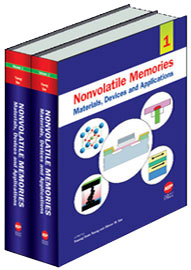|

 
|
|
NONVOLATILE
MEMORIES-Materials, Devices and Applications
2-Volume set
| |
|
 2-Volume Set
2-Volume Set |
Edited by
Tseung-Yuen Tseng and Simon M. Sze
National Chiao
Tung University, Taiwan
|
| |
|
2012,
ca. 850 pages, Hardcover
ISBN: 1-58883-250-3
US$695.00
|
|
 |
ABOUT
THIS BOOK |
| Nonvolatile
semiconductor memory (NVSM) is one of the most important discoveries
in the field of electron devices since the invention of the
transistor. Invented by D. Kahng and S.M. Sze in 1967, NVSM, today,
is the largest electronic industry in the world. This single
invention has subsequently given rise to a large family of memory
devices including flash memory and electrically erasable
programmable read-only memory (EEPROM). All modern electronic
devices, like mobile phones, notebook computers, digital cameras,
MP3 music players, personal digital assistants, digital televisions,
automotive engine control units, portable medical diagnostic
systems, USB flash personal discs, and global positioning systems,
are all based on NVSM. In the past 20 years, NVSM’s minimum
feature length has been scaled down from 0.8 ?m to sub-20 nm—a
40-fold reduction. Many alternative NVSM technologies are being
developed to reduce the size (sub-10 nm) and improve device
performance. Nonvolatile Memories is a two-volume book containing 32
state-of-the-art chapters written by 71 world-leading experts on
nonvolatile memories. It includes comprehensive coverage of the
physics, material science, device engineering, and applications of
nonvolatile memory devices. The book summarizes the most recent
advances and future trends in the field of nonvolatile semiconductor
memory. This book is intended as a reference book for engineers and
scientists actively involved in semiconductor device research and
development. It also serves as a textbook for senior undergraduate
and graduate students in applied physics, materials science and
engineering, electrical and electronics engineering, who have
already acquired a basic understanding of semiconductor device
physics. |
CONTENTS
|
| Volume 1 |
 |
An Introduction to Nonvolatile Memories, Tseung-Yuen
Tseng and Simon M. Sze |
 |
Silicon-Based Thin-Film Transistor Nonvolatile Memories,
Andrew J. Walker |
 |
Nonvolatile Memory Devices with Nanocrystals and
Dielectrics, Ting-Chang Chang, Fu-Yen Jian, Shih-Ching Chen,
and Chih-Tsung Tsai |
 |
Electrical Properties and Nonvolatile Memory Applications
of Semiconductor Nanocrystals and Metal Nanoparticles, Y.
Liu and T. P. Chen |
 |
Material and Geometric Design of Nanocrystal Flash Memory,
Shantanu R. Rajwade and Edwin C. Kan |
 |
Self-Consistent Quantum-Mechanical Analysis of Nanocrystal
Flash-Memory Operation, Jeanlex Soares de Sousa and
Jean-Pierre
Leburton |
 |
Si Nanocrystal Memories: From Materials to Device
Characteristics, Salvatore Lombardo and Cosimo Gerardi |
 |
Nonvolatile Memories Using Si Quantum Dot Double-Junction
Tunnel Layers, Ryuji Ohba |
 |
Application of a High-Dielectric for a Flash-Memory Device,
Jong Kyung Park and Byung Jin Cho |
 |
Development of Non-Volatile Flash Memory Using a High-k
Charge-Trapping Layer, Gang Zhang and Won Jong Yoo |
 |
Ultra-High-Density Non-Volatile Flash Memory Devices
Realized on CMOS Si Nanowires, Dim-Lee Kwong, Yuan Sun, Yu
Hongyu, Navab Singh, and Guo-Qiang Lo |
 |
Emerging Constraints on NAND Flash Memory Reliability, Christian
Monzio Compagnoni, Alessandro S. Spinelli, Andrea L. Lacaita,
Andrea Ghetti, and Angelo Visconti |
 |
Ferroelectric Memory: Materials and Devices, Tian-Ling
Ren |
 |
The Material Fabrication, Device Structure, and Working
Mechanism of Ferroelectric Memory, A. Q. Jiang and T. A.
Tang |
 |
Overview, Future Prospects, and Applications of FeRAMs,
Daisaburo Takashima |
 |
Magnetoresistance Behavior of Ferromagnetic Nanorings, A.
O. Adeyeye and S. Jain |
Volume 2
 |
Phase Change Materials: Research Developments and Device
Applications, Kuan-Neng Chen, Hsiang-Lan Lung, Yu Zhu,
Huai-Yu Cheng, and Frederick T. Chen |
 |
Phase Change Memory, Dae-Hwan Kang, Ki-Bum Kim,
Byung-Ki Cheong, and Hong-Sik Jeong |
 |
Phase Change Random Access Memory, L. P. Shi and R.
Zhao |
 |
Phase Change Memory Physics-Based Modeling:
Electrical Characteristics, Scaling, and Reliability, Daniele
Ielmini |
 |
Metal-Oxide-Based Resistive-Switching Memory: Materials,
Device Scaling, and Technology Design, Jinfeng Kang, Bin
Gao, and Bin Yu |
 |
Resistance Switching Effects in Transition Metal Oxide Thin
Films for Nonvolatile Memory Applications, Dinghua Bao |
 |
Resistive-Random Access Memory Based on Amorphous Films,
Yuchao Yang and Wei Lu |
 |
Overview of Metal-Oxide Resistive Memory, Chia Hua Ho
and Fu-Liang Yang |
 |
Resistive-Switching Memory Devises Based on Metal Oxides:
Modeling of Unipolar Switching, Reliability, and Scaling, Carlo
Cagli and Daniele Ielmini |
 |
Organic and Polymer Nonvolatile Memories: Materials,
Devices, and Working Mechanisms, Wei Lek Kwan and Yang Yang |
 |
Material, Device, and Circuit of Organic Nonvolatile
Memory, Zingway Pei and Heng-Tien Lin |
 |
Organic/Polymeric Films with Resistive-Switching Behavior
and Their Application as Nonvolatile Memory Devices,
Jianyong Ouyang |
 |
Organic Resistive Switching for Nonvolatile Memory
Application, Byungjin Cho, Tae-Wook Kim, Yongsung Ji,
Sunghoon Song, and
Takhee Lee |
 |
Nonvolatile Memories for Radiation-Hardened Applications,
Xiaoli He and Wei Wang |
 |
Nonvolatile Quantum Memory, Oleksandr Voskoboynikov |
 |
Search for Frontrunners Among Emerging Non-Volatile Memory
Technologies: Sttram or Resistive Switching Random Access
Memories or Others, Alois Gutmann and Jin-Ping Han |
|
READERSHIP |
| The
2-volume book is intended as a reference book for engineers and
scientists actively involved in semiconductor device research and
development. It also serves as a textbook for senior undergraduate
and graduate students in applied physics, semiconductor physics,
materials science and engineering, electrical and electronics
engineering, device engineering who have already acquired a basic
understanding of semiconductor device physics. |
Terms and Conditions
Privacy Policy Copyright
© 2000-
American Scientific Publishers. All Rights Reserved.
|
 2-Volume Set
2-Volume Set